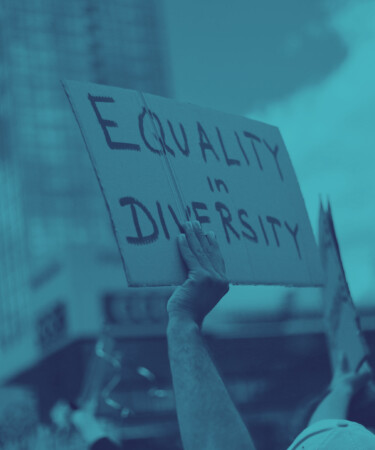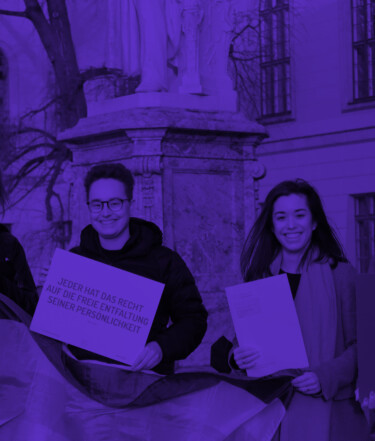
Using the law to combat discrimination - lawsuits under the Berlin State Anti-Discrimination Act
The GFF launches a new litigation fund and coordinates strategic proceedings under the Berlin State Anti-Discrimination Act.
Public authorities must not discriminate against people on the basis of gender, race or disabilities - Article 3 (3) of the Basic Law speaks a clear language. The Basic Law thus places those people under special protection, who are historically and structurally affected by social inequality. The government is hence prohibited from treating people worse than others because of these characteristics without a compelling reason. However, the reality is often different. Moreover, those who want to defend themselves against discrimination by public authorities often do not achieve much in practice with the available legal options.
In order to change that, the Berlin House of Representatives passed the State Anti-Discrimination Act (Landesantidiskriminierungsgesetz, LADG), which came into force in June 2020. The LADG makes it easier to take action against discrimination by public bodies such as schools and universities, administrative authorities or the police. Anyone who is discriminated against by employees or public authorities of the state of Berlin can now file a lawsuit against this under the LADG and receive compensation for damages incurred as well as for injustices suffered. Berlin is the first and so far the only federal state to make it possible to hold public authorities accountable with such a state law. This closes an important gap in the system of legal protection: The General Equal Treatment Act (Allgemeines Gleichbehandlungsgesetz), the federal 'sibling' of the LADG, only applies to discrimination in private areas such as at work, in the rental market or in mass transactions.
Important change brought about by the LADG
The LADG brings another important change: collective actions - so far known mainly from environmental law. This means that not only affected persons but also qualified associations are now able to file lawsuits. The GFF is recognised as an organisation entitled to bring collective actions. Instead of the person experiencing discrimination filing a lawsuit themselves, the GFF can now do that on their behalf with their consent. In addition, the GFF can bring actions against structural discrimination, for example by a public authority's practice or a legal regulation. In short: affected persons are no longer alone in asserting their rights.
Prohibition of discrimination, § 2 LADG (GFF translation): No person may be discriminated against within the framework of public-law action on the basis of gender, ethnic origin, a racist and anti-Semitic attribution, religion and world view, disability, chronic illness, age, language, sexual and gender identity and social status.
With the fund, the GFF wants to financially enable strategic landmark lawsuits under the LADG and use the new legal opportunities of the law in the fight against discrimination. The litigation fund promotes strategic lawsuits according to strict selection criteria, which focus on structural discrimination beyond the individual case. The GFF works closely with the
Anti-Discrimination Network Berlin (ADNB) of the Turkish Federation in Berlin-Brandenburg (TBB). The GFF has appointed a special advisory board to monitor the litigation fund. With Eva Andrades, managing director of the Anti-Discrimination Association Germany (advd), the lawyer Kerstin Kühn and the lawyer Maryam Haschemi Yekani, the GFF was able to win three experts who, with their outstanding experience in anti-discrimination law, will support the GFF legally and strategically regarding case selection and legal enforcement.
Counselling organisations and individuals affected by discrimination can send enquiries to the contact address
antidiskriminierung@freiheitsrechte.org. Charlotte Heyer and Shemi Shabat are the responsible contact persons at the ADNB of the TBB, which advises people affected by discrimination.



